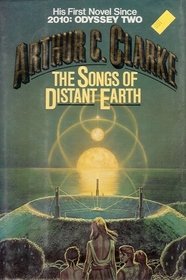Helpful Score: 2
This is a very humanistic science fiction story. Although the story deals with applied science, fantastic technologies, space travel, human colonies and their logistics, it also handles the emotions and feelings of the characters. What is also special about this story is that it doesnt deal with sci-fi fantasies like galactic civilizations or tele-transportation and there is neither sex nor violence. In it, there is a very sweet love story in which the characters cant be together for the rest of their lives, so she decides to have his son to remember him until her death, which she does, but the fact is that he outlives both of them. How? Well, he is traveling away from them at high speed to the original place where his spaceship was supposed to go and due to the effects of hibernation, he lives longer. Once awaken to start the original mission which is to colonize another planet, he gets to see her accumulated messages and notices their aging, through the years in which she and his son sent the messages to the automated communications system in his ship. He cant answer the messages because to get to the new planet three hundred years had to pass. One can also feel poetic tones in the authors writing.
Helpful Score: 1
Not Clarke's best work but fine read that will be appreciated by any fan of the genre.
Helpful Score: 1
Arthur C. Clark (most notably known for 2001: A Space Odyssey) writes another brilliant sci-fi novel. He even has an intro, basically deriding some of the current science fiction as "fantasy" because it has so little basis is science.
He starts with our sun preparing to go nova, and the spur to seed other planets. Once such seed planet, Thalassa, is then visited by a later ship, and Clark goes on to explore the interaction between the two societies.
His science, of course, is impeccable and believable in context with today's knowledge. Some of the conflicts (possibility of intelligent life, new and exciting versus known personalities, etc.) are typical of science fiction, exploring human behavior and interaction within the framework of fantastic situations.
A thoroughly good read, worthy of Clark! My only complaint might be that it is too short at 300 paperback pages; I think I could say that about a lot of good books, though.
He starts with our sun preparing to go nova, and the spur to seed other planets. Once such seed planet, Thalassa, is then visited by a later ship, and Clark goes on to explore the interaction between the two societies.
His science, of course, is impeccable and believable in context with today's knowledge. Some of the conflicts (possibility of intelligent life, new and exciting versus known personalities, etc.) are typical of science fiction, exploring human behavior and interaction within the framework of fantastic situations.
A thoroughly good read, worthy of Clark! My only complaint might be that it is too short at 300 paperback pages; I think I could say that about a lot of good books, though.
Helpful Score: 1
Songs of a Distant Earth is not very song-like. Clarke writes more in Jules Verne sci-fi tradition, exploring the immediate implications of a technical idea, rather than broader contemplation. The story revolves around a space ship arriving at a colony. The colonists have never seen actual terrans; they were started by machines from DNA samples after a long slower than light journey. The new, faster than light ship has fled the destruction of earth, with cryo-sleeping passengers. We hear their disparate stories of a new colony scrabbling for full life on a planet with little land. We hear of the demise of earth and the mass psychosocial consequences of its impending doom. We see their mixing and the first risings of a new semi-intelligent race. That's it. Little is developed, changed, or resolved. We gradually reveal these two twined stories, then, like a music box out of power, the Songs of a Distant Earth stop.





